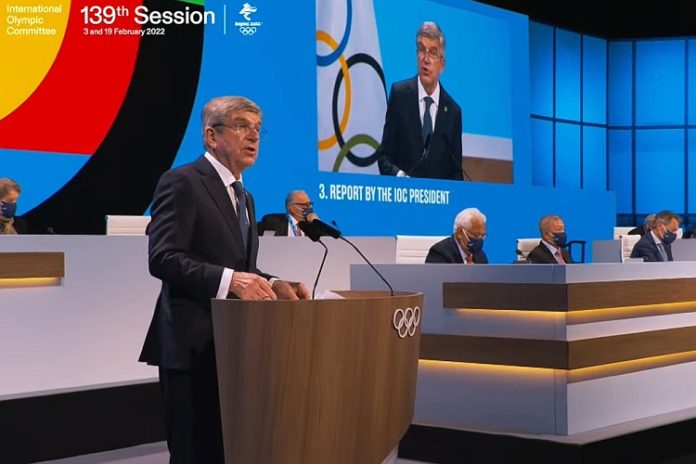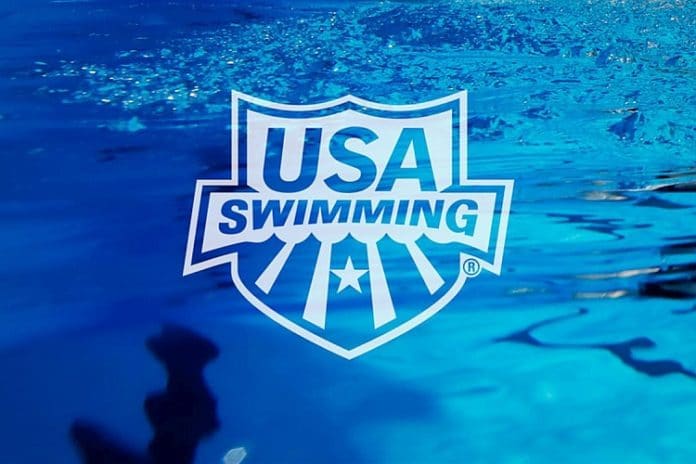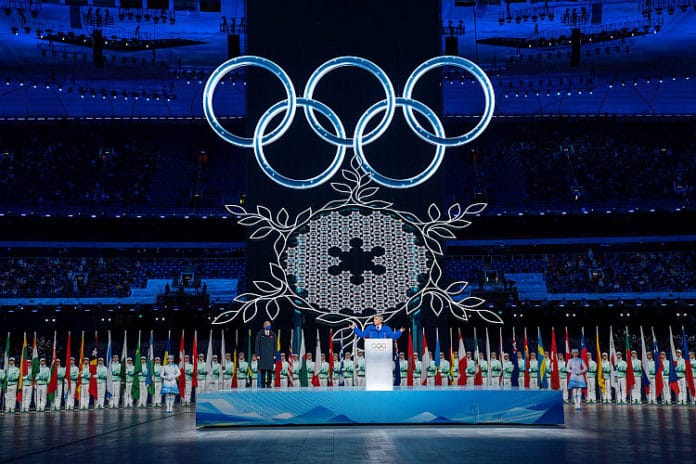Key status updates on the urgent stories in Olympic sport:
≡ BEIJING 2022 ≡
“Our responsibility is to ensure all athletes can come together for this peaceful competition. …
“We know that sport alone cannot create peace. We cannot take decisions on war and peace. This is the exclusive remit of politics. But when it comes to peace, , also words and symbols are important, because – again – these symbols, the symbol of the Olympic Games show us how the world can look like if we respect the same rules and each other.
“The Olympic Games are this symbol of peace and unity, showing us the way to a better and more peaceful future.
“This is why we call on all political leaders, around the world, to observe their commitment to the Olympic Truce. So that these Olympic Winter Games can become this precious symbol of peace and unity.”
International Olympic Committee Thomas Bach (GER) told the IOC members present in Beijing for the 139th Session that while the Tokyo Games was a remarkable success, that “the dark clouds of politicalization of sport” and that even “the boycott ghosts of the past were rearing their ugly heads again” were descending in the first half of 2020. He emphasized that the IOC’s continuing outreach to world leaders on the importance of political neutrality of the Olympic Games has been an effective response, especially in the consensus adoption of the Olympic Truce at the United Nations.
Looking forward, Bach said that Paris 2024 “will be the beginning of a new era” for the Olympic Movement, especially with concepts like the Opening Ceremony on the Seine River that will be able to be seen by more than 600,000 people.
Bach’s report was followed by comments, with four IOC members with backgrounds in basketball, table tennis, track & field and wrestling all castigating FIFA with prepared remarks.
Algerian member Mustapha Berraf, formerly a basketballer, said that a move by FIFA to a biennial World Cup would be a disaster (as interpreted from his comments in French):
“Indeed, the plan promoted by FIFA as we speak, would create really immeasurable damage, and would put in danger sport in general and in particular, football. This question and this issue, would simply push aside other sports and relegate them to the back benches and that would be absolutely unacceptable from our perspective.
“On top of that, it would also create a rift between women’s sports and male sports and it would be a setback to all our efforts to promote equity and parity amongst all sports.”
This was followed by comments from United World Wrestling chief Nenad Lalovic (SRB), Korean table tennis star Seung-min Ryu (KOR) and French IOC member Guy Drut, the 1976 Olympic 110 m hurdles champion, all in the same vein and previously prepared.
Bach cut Drut off and ended the discussion, noting that FIFA President Gianni Infantino (SUI), also an IOC member, was not present in Beijing – he is in Cameroon for the African Cup of Nations – and the comments should not continue in his absence. Bach did agree to forward the comments made to Infantino and FIFA for further discussion, which was met with applause.
The IOC’s displeasure, however, did come through during the Program Commission discussion of Los Angeles 2028 (see below).
¶
At the post-Session news conference, Bach and IOC Olympic Games Executive Director Christophe Dubi were asked about the security of athletes who wished to “express themselves” during the Games, considering China’s repressive speech policy. Bach gave a lengthy, impassioned reply, which included:
“The procedures are very clear that in case of any infringement, then the IOC Disciplinary Commission will take care of it and it’s the same situation as we had in Tokyo. There is no difference. The rule has not changed and the attitude of the IOC has not changed. …
“Everybody has always to know you have your individual freedom, and I have political opinions, and athletes can have political opinions. But when you join an organization, when you engage in an event, be it the actor in the theater, be it the athlete in the Games, you have to respect the rules which are made in the overall interest of the organization you are engaging with.
“The theater can only work if they play the plays, and the Games can only work if it’s about sport and the rules of the game are respected and the mission of the Games is respected. So it’s not a rule which is unique to the Games or to sport.”
Dubi added, “In 2015 we’re here, at the time of the candidature and this is a guarantee we ask and this is a guarantee we obtained. Since then, we’ve had the conversation many times and in no equivocal terms. Never have we been under the impression that the IOC would not be the decision-[maker] when it comes to Rule 50.2.”
Prodded further, Bach added:
“The athletes enjoy the freedom of speech in the press conferences or the social media, and this is enshrined, implicitly, in the Rule 50 because the Rule 50 speaks only where you cannot. I think the same rules apply worldwide. I would suggest to any athlete, wherever the Games are taking place, whenever an athlete is making a statement, that he does not insult other people, that he is not violating the rights of other people.”
There were multiple questions about Chinese tennis star Peng Shuai and whether the IOC itself would pursue an investigation of her sexual-abuse allegations. Bach said this is the wrong question:
“I took the initiative that I want to meet personally, once I arrive here in China. And this will happen. And then in all these conversations, it is also, I think, not only a sign of respect, it’s a necessity, then, to respect her. And then to listen to her, and how she sees the situation, how she wants to live her life. This is what we are, step by step, trying to find out, and if she wants to have an inquiry, we would also support her in this, but it must be her decision.
“It’s her life, it’s her allegations. We have heard the allegations and we have heard the withdrawal and we will have this personal meeting and there we will continue this conversation and then we will know better about her physical integrity and her mental state when we can finally meet in person and this was the objective of this initiative from the very beginning.”
Asked what the legacy will be of the 2022 Winter Games, Bach was direct: “China is a winter-sport country.”
¶
Beijing 2022 Vice Chair Yang Shuan made the report of the organizing committee, welcoming the IOC members to Beijing and noting that 91 National Olympic Committees have entered the Games, with a total of 2,877 athletes registered.
He stated that some 19,000 volunteers will be assisting with the operation of the Games; the organizing committee staff apparently numbers about 8,000.
Yang also announced that about 150,000 spectators – about 50% of capacity – are expected to be invited. The spectators will come from both inside and outside the closed loop, and those from outside the loop made up of local residents and middle school students, among others.
¶
The Covid testing report for 2 February showed the largest one-day total of positives at 55 in total, with 26 from athletes and team officials and 29 among all others. As expected, most of these were at the airport, with 29 total positives out of 753 tests (3.9%) and 26 positives out of 67,137 tests inside the closed loop (0.04%).
The expectation from the IOC’s Medical Expert Panel is that positives will continue to go down as the number of new arrivals to Beijing for the Games trickles down.
The U.S. Olympic & Paralympic Committee reported:
“Of the 441 U.S. Olympic delegates in China on Feb. 2, one new COVID-19 case was confirmed, bringing our total to eight in isolation, including two athletes.”
¶
The IOC announced its Women in Sport awards for 2021, with Tokyo 2020 President Seiko Hashimoto named the World winner, with continental awards for
● Africa: Natsiraishe Maritsa (ZIM: Vulnerable Underaged People’s Auditorium Initiative)
● Americas: Figure Skating in Harlem (USA)
● Asia: Zhang Xia (CHN: Chinese Wrestling Association)
● Europe: Kari Fasting (NOR: Women’s Sport International)
● Oceania: Tracey Holmes (AUS: Australian Broadcasting Corporation)
The awards recognize exceptional men, women and organizations for their work in advancing gender equality on and off the field of play.
¶
There was competition in Beijing for a second day in the Curling Mixed Doubles, with the U.S. pair of Vicky Persinger and Chris Plys losing to Italy (8-4) and Norway (11-6) to fall to 1-2 in round-robin play.
In Freestyle Moguls, reigning Olympic champ Mikael Kingsbury (CAN) led the men’s qualifying, with Americans Cole McDonald and Dylan Walczyk also advancing to the quarterfinals. The women’s leader was Australia’s Jakara Anthony, with U.S. stars Jaelin Kauf, Olivia Giaccio and Hannah Soar all advancing.
The U.S. women’s ice hockey team began defense of their 2018 Olympic title with a 5-2 win over Finland. The Americans got goals from Amanda Kessel and Alex Carpenter in the first period, and two from Kendall Coyne Schofield in the second for a 4-0 lead. Carpenter got a second goal in the final period, with Finland’s Susanna Tapani getting two.
Three-time Olympian Brianna Decker, a key forward for the U.S., was tripped during the first period and suffered a left leg injury that will eliminate her from the tournament. She was carried off on a stretcher, but came back into the arena later in street clothes and crutches.
Canada opened play with a 12-1 win over Switzerland.
≡ THE 5-RING CIRCUS ≡
● Games of the XXXII Olympiad: Tokyo 2020 ● The Tokyo organizers made their final report to the IOC Session, with Hashimoto urging a simpler and more streamlined event in the future:
“Using the Tokyo Games operation as a reference, I believe there needs to be a serious discussion and consideration that goes back to basics.”
The final cost of the Games was estimated at $13.6 billion U.S., with a final accounting due in June. The promotional effort to encourage sports activity in the Tokyo area was considered a success, with Tokyo-area resident participation increasing from 39 per cent in 2007 to 69 per cent last year.
● Games of the XXXIV Olympiad: Los Angeles 2028 ● The IOC Session unanimously approved the recommended initial sports program of 28 sports for the LA28 Games, with the possibility to add back boxing, modern pentathlon and weightlifting if those federations reform their operations as required by the IOC.
This was completely expected after the IOC Executive Board had already approved the recommendations of the IOC Program Commission, but there are some twists.
First is that while the list of 28 sports has been agreed, the disciplines and events within each sport are now subject to a detailed review by the IOC and the LA28 organizers, to be completed by the second quarter of 2023.
LA28 has reserved the “right to further consider one/two additional sports in 2023,” to be considered by the IOC Session in mid-2023. The IOC Executive Board is expected to confirm the entire 2028 event program in the fourth quarter of 2024.
Also, the list of sports whose inclusion for 2028 is in question was expanded from three – boxing, modern pentathlon and weightlifting – to four, including football, in case FIFA does go ahead with a biennial men’s World Cup, which would be first implemented in 2028.
As with the IBA, UIPM and IWF, FIFA is now on notice.
¶
● Anti-Doping ● World Anti-Doping Agency President Witold Banka (POL) gave a detailed report to the IOC Session, including enthusiasm for the new “dried blood spot” testing method.
In response to a question, he clarified that – at least at present – the dried blood spot method is being introduced in addition, and not replacement, of “traditional” collection methods, i.e., urine samples.
But the hope for the future that such irritating and unpleasant forms of specimen collection can be replaced.
● Swimming ● Yesterday’s story on the new USA Swimming transgender rules was corrected to show that the World Athletics regulations for transgender athletes apply to all athletes. Becca Peter of PoleVaultPower.com points out correctly that the limits of their policy from 400 m to the mile only applies to athletes with differences in sex development (DSD). Thanks, Becca!
≡ SCOREBOARD ≡
● Football ● The U.S. Men’s National Team needed a win against Honduras in frigid conditions at Allianz Field in St. Paul, Minnesota on Wednesday night and playing against the last-place team in the CONCACAF qualifying tournament: Honduras.
And after struggling mightily to score goals, especially in the first half, the American squad scored twice in the first 37 minutes on the way to a 3-0 victory.
Temperatures were officially recorded at just 5 F (wind chill about -12 F) at kickoff, but the coldest conditions for any U.S. men’s national team game in history did not appear to cause significant problems for either team. But the U.S. offense had been frozen in the first half of its qualifying Games, but in the eighth minutes, a free kick from beyond the box by Kellen Acosta landed on the head of Weston McKennie at the right side of the goal, and his volley flew into the net for a 1-0 lead. It was the first U.S. goal off of a free kick or corner in its 11 CONCACAF qualifying tournament games!
The U.S. dominated play, with most of the game played in the Honduran end or midfield, and after a couple of missed chances, another Acosta free kick dropped right in front of the goal in the 37th minute. Striker Jordan Morris hit it first, but was blocked and as the rebound came free, defender Walker Zimmerman twisted around Honduran midfielder Kevin Lopez and sent a right-footed kick into the goal: 2-0. A potential foul on Zimmerman was reviewed, but the goal was declared good.
The half ended with 74% possession for the U.S. and an 8-1 edge on shots. And the second half was more of the same.
Only one more goal was scored, by Christian Pulisic – who entered as a sub for Morris in the 64th minute – on a right-footed laser from the top of the box in the 67th minute after two ricochets from an Acosta corner kick close to the goal.
There were more U.S. chances, with a final total of 16 shots to two for Honduras, and the Americans ended with 73% possession at game’s end. Attendance was recorded as a sell-put at 19,202.
The victory gives the U.S. a 6-2-3 record and 21 points in the CONCACAF qualifying standings. Canada continues to lead, after a 2-0 win at El Salvador, and is 7-0-4, with 25 points. Mexico defeated Panama in Mexico City, 1-0, in a very physical game, on a penalty kick by striker Raul Jimenez in the 80th minute. That leaves Mexico also at 6-2-3 with 21 points, but +6 on goal differential vs. +9 for the U.S.
Panama remains fourth (5-4-2) with 17 points. Costa Rica defeated Jamaica, 1-0, to stay fifth with 16 points (4-3-4). The final window of matches will begin on 24 March.
You can receive our exclusive TSX Report by e-mail by clicking here. You can also refer a friend by clicking here, and can donate here to keep this site going.
For our 832-event International Sports Calendar for 2022 and beyond, by date and by sport, click here!


























